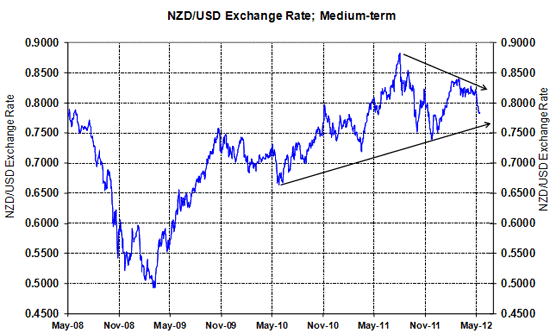
 By Roger J Kerr
By Roger J Kerr
True to historical patterns and form, the Kiwi dollar goes down the elevator shaft rather quicker than it goes up the escalator.
The five-cent drop in the NZD/USD exchange rate from 0.8300 just over a week ago to 0.7800 on 14 May cannot be seen as too surprising, given that all the lead-indicators were pointing downwards and the Kiwi dollar was lagging in its response.
The initial selling was related to the Australian interest rate cut, lower wholemilk powder prices and the local moneymarket pricing-in interest rate cuts for New Zealand as well.
However, over recent days the weaker than expected Chinese industrial production figures that prompted further monetary loosening by the PBOC have caused lower global commodity prices, thus a lower AUD and NZD against the USD.
It should be remembered that that the two “commodity/growth” currencies (AUD and NZD) appreciated sharply in the first few weeks of January this year as a result of stronger than expected Chinese economic data - the Kiwi dollar jumped from 0.7600 to 0.8400.
It was always expected that the AUD and NZD would come back down again if and when the Chinese economic numbers came out weaker than what the markets were expecting.
Assisting the negative sentiment towards the NZD over recent times has been the “risk-off” mode in global financial and investment markets as a result of increased uncertainties in Europe.
While the political developments in France and Greece are eroding investor confidence, it does not appear that we are in for another “Lehman-type” event or meltdown similar to what was experienced in 2009. There are of course no short-term solutions to Europe’s deficit and debt problems and only a return to positive economic growth can improve bank and Government balance sheets. That will take years to achieve and in the meantime the Government austerity measures are negative for economic growth.
The EUR exchange rate has finally weakened below $1.3000 against the USD and this has been another contributing factor that has pushed the Kiwi dollar down below 0.8000.
The aforementioned explanations are all factual as to what has happened in the recent past that has bought the NZD/USD exchange rate to 0.7800.
What is far more interesting is what are the variables and probabilities that will move the NZD currency value over the next few weeks and months?
The downward momentum currently in the marketplace does suggest further weakness to the 0.7700/0.7600 region in the short-term, however beyond that it should not be automatically expected that the Kiwi will tumble further to the low 0.7000’s.
A number of stars would have to align for the Kiwi dollar to plunge another five cents from current spot rates of 0.7800.
The following influencing factors that could produce a 0.7300 NZD/USD exchange rate do not appear to have a high probability of occurring, namely:
- The USD itself appreciates strongly against all currencies – whilst the US economy is starting to perform better than others it is still some time away before rising US interest Rates make the US dollar a stronger currency in its own right.
- The RBNZ cuts official interest rates – the local moneymarkets are currently pricing-in a 0.25% cut by September, however the lower currency value has already loosened monetary conditions and there is no argument for the RBNZ to loosen further in the face of various upwards inflationary pressures in the NZ economy.
- Wholemilk powder prices continue to plummet – the dramatic price reductions from USDS3,700/MT to USD2,700/MT over recent months has largely been due to short-term over-supply factors with increased milk production in NZ, Europe and the US put onto the internationally traded market. Given the positive underlying demand features for milk powder it is difficult to see prices continuing to drop to say below USD2,000/MT that would pull the Kiwi dollar to the low 0.7000’s.
- An escalation in European debt problems causing global sharemarkets to dive again – if global equity markets were really worried about the current Greek situation causing another major blow up in Europe they would have already weakened much more than they already have. Whilst Europe is a risk, the daily news is not influencing global market sentiment as much as it was in 2009 to 2011.
The greater probability for NZD currency movements is that it now spends some time in the 0.7650 to 0.7900 trading range.
The Asian central banks and sovereign wealth funds who have been buyers of NZ dollars this year may be holding off in the meantime to see where the Kiwi stabilises.
However, they will return as Kiwi buyers once that happens, as relative to most other currencies and economies in the world, the New Zealand story on medium to longer term economic fundamentals remains positive.
In the meantime, the Kiwi dollar has strong technical support at 0.7650 as the chart below shows.

The clear pattern in recent years is that every dip lower in the NZD/USD exchange rate ends at rate higher than the previous dip. We must be doing something right in the eyes of the rest of the world.
--------------------------------------------------------------------------------------------------------------------------------
To subscribe to our daily Currency Rate Sheet email, enter your email address here.
--------------------------------------------------------------------------------------------------------------------------------
* Roger J Kerr runs Asia Pacific Risk Management. He specialises in fixed interest securities and is a commentator on economics and markets. More commentary and useful information on fixed interest investing can be found at rogeradvice.com




We welcome your comments below. If you are not already registered, please register to comment.
Remember we welcome robust, respectful and insightful debate. We don't welcome abusive or defamatory comments and will de-register those repeatedly making such comments. Our current comment policy is here.